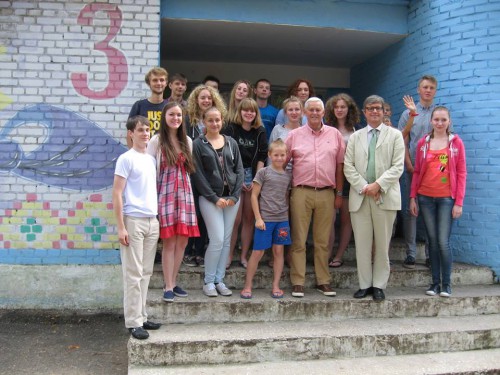24th October 2014
Youth – or the transition from childhood to adulthood
I give many talks in English because there is a good demand for me to do so. Most of my audiences are younger people at universities, and one asked earlier this year how different young people in Belarus were to those in Britain. I had to think hard before I gave my answer.

Much of my experience of young people in Britain is through my two teenage sons. So I thought that my views of young people in Britain might not be the most objective, or coloured by my relationship with them, as their father.
On the other hand, most of my experience of young people in Belarus has been when I’ve met them in my role as ambassador. I found them usually very polite and respectful, if a little surprised to meet someone like me. So I don’t think I have a good idea of what it’s like to be a young person in Belarus.
My thoughts then turned to an article on Belarus that I had read in the British media. I recalled a comment that the writer hadn’t seen any tattoos on young people. Almost as soon as I’d read the article, I seemed to see tattoos on young people whenever I went out in Minsk.
I thought about media coverage of young people in Britain. This is a subject of continual debate, and opinions seem sharply divided in a typically British way. Sometimes the subject is trivialised – when opinion writers use the word “yoof” ironically for anything about young people – or there is over-reaction when some particularly horrible crime is committed by “feral youths”.
I wish I had spoken to my visitor of last week, Professor Howard Williamson, before I gave my reply. He has broad experience as an academic researcher, youth worker and policy adviser to the British government. He is active in the Council of Europe, and co-ordinated international reviews of national youth policy in other European countries. Belarus is one of the last European countries he had visited.
I chatted to him about lots of issues that have some bearing on youth policy (or vice versa). So we covered education, and how the link between education and employment has changed in recent years. We talked of the problems of social exclusion, criminality, abuse of narcotics and other substances.
We also talked about positive issues, like the opportunities for young people in performing either on stage or on the sports field. We talked about volunteering, and the socialisation of children, and about the importance of families, and of community support. We talked of fashions, hobbies, the “package of experience” that some young people have, and how travel was an important part of education.

We talked of social changes in Britain particularly in the 1960s, the era when teenage culture became more main-stream. This was when the “baby-boomer” generation of roughly 1945-1964 started to come of age, and seemed unwilling to accept parental responsibility children, and to treat them as friends not children.
We also talked about cycles of opinion. Every generation goes through a phase when the behaviour of young people is stigmatised. He reminded me of the book “Hooligan – A History of Respectable Fears” whose author, Geoffrey Pearson, suggested older people disapprove of the behaviour of young people, but have selective memory about their own youth.
The term “hooligan” was invented at the end of the 19th century to describe violence in South London committed by gangs of young people. The word spread rapidly around the world in the early 20th century, including to imperial Russia. I still find it disconcerting to hear “хулиганство” (hooliganism) being used in Russian. Whereas in English it is still used as a term of disapproval in ordinary speech, it has become a crime in Russia, and a catch all term for prosecuting unapproved behaviour.
My answer could have been much richer (and longer) than what I actually said. I would probably taken some of Prof Williamson’s description of the need to manage carefully the transition from childhood to adulthood, that young people develop in different ways in different communities, and interventions by state organisations should be positive in support and encouragement of young people, and only negative when tackling dangers to themselves and others.
What I said – after some reflection that probably only lasted a few seconds, but felt much longer – was that young people in Belarus didn’t seem different from young people in Britain. They were sometimes boisterous, sometimes anxious; concerned about their future, but keen to make their mark in the world, and to enjoy themselves.
And, as I learnt last week, the issues that concern the authorities in Belarus about young people are not so different – the dangers from new types of drugs, and difficulties of tackling social exclusion.
What I now would say is: that to be young is a time to cherish the opportunities that come through education, of physical exercise, and self-expression. And that other people should cherish young people for what they are – our future.
I think that you have it about right Bruce, however I would add that although Belarusian youth can be nieve about some things, they are generally more street wise than UK youth, and are allowed a freedom outside the home that we in the UK don’t like our kids to have.